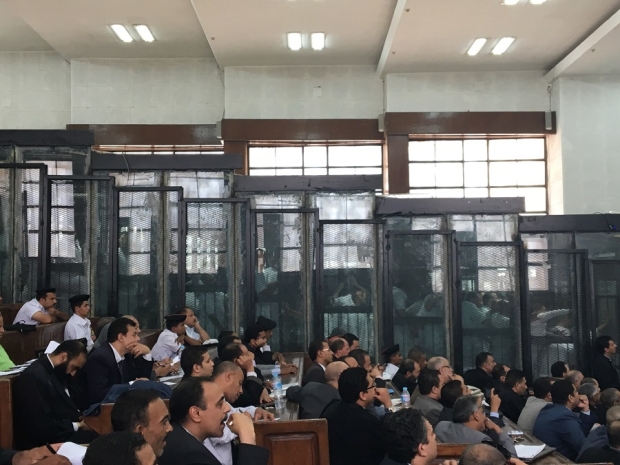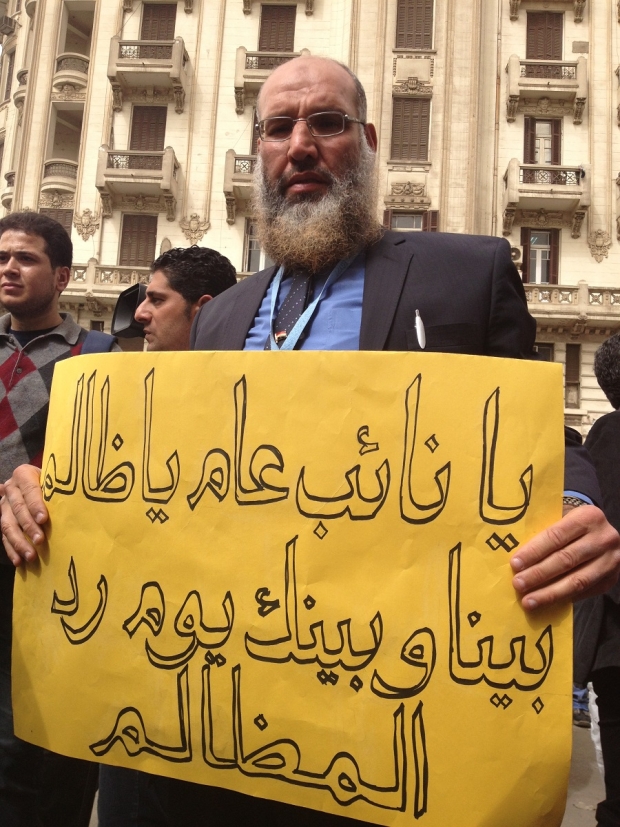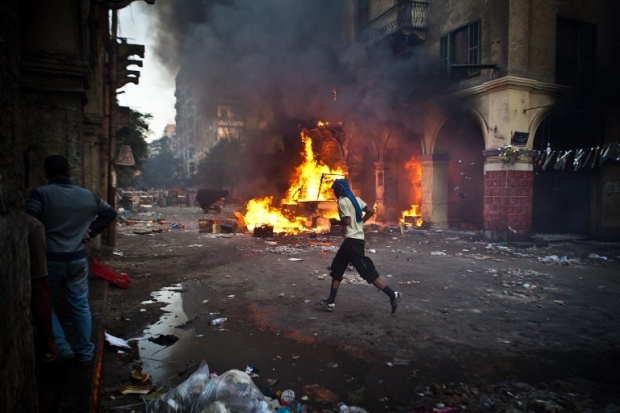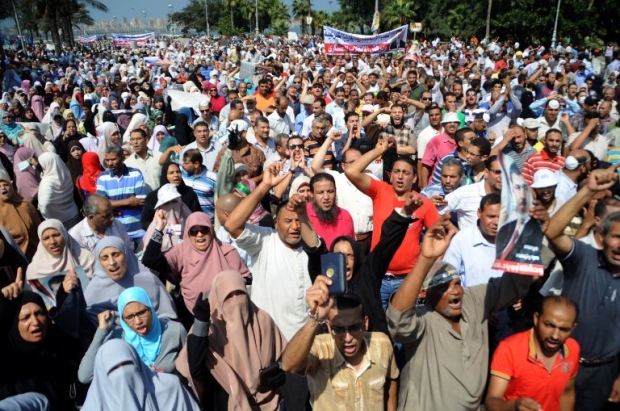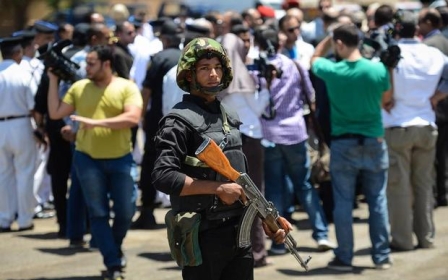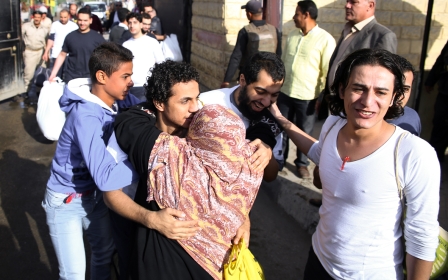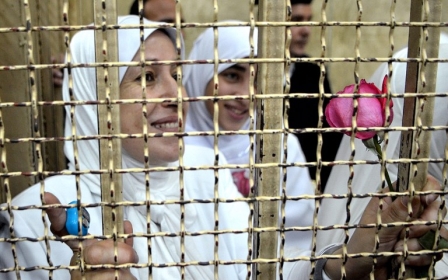Life after prison in Egypt: 'My soul was stolen'
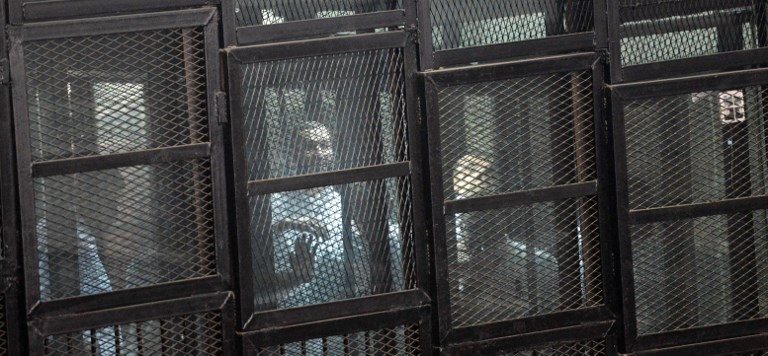
CAIRO – In a Cairo cafe close to Tahrir square, Akram Fatouh recalls the day, more than three years ago, when dozens of armed men stormed his home at 2am and arrested him.
“I will never forget how scared my mother and sister were,” Fatouh told Middle East Eye.
I was buried in a tomb
- Akram Fatouh, former political prisoner
Fatouh was charged with illegal protesting, rioting, and attacking policemen during a demonstration in Assiut in March 2014 against the overthrow of President Mohamed Morsi.
Fatouh said the charges were rigged because he did not even take part in the protest.
“My name was randomly put on the investigation list. I never participated in that protest. We tried to prove that I wasn’t in that place, but it was in vain,” he said.
According to Fatouh, the judge never even looked at the medical prescription that proved he had been at the dentist at the time of the protest.
“I wasn’t given the full chance to defend myself. This was absolutely unfair,” he said of the ruling.
I simply lost my appetite for life
- Ahmed Mostafa, former political prisoner
Mass trials were common after the military deposed Morsi in 2013. Hundreds of people, especially Morsi supporters, have received death sentences or long prison terms. Both local and international rights groups have repeatedly voiced criticism, saying that many or all of the mass trials have been legally flawed.
Fatouh has never been able to forget his “horrible” time in Assiut prison.
“We were 40 people in a cell that could barely fit 20. We could never all sleep at the same time because of the limited space. We had to sleep in shifts - something that makes you feel like you are not human,” he said.
“I was buried in a tomb,” he added.
Fatouh recalled the time he had overheard his neighbours gossiping about him, describing him as being a member of a “terrorist cell”.
“They avoid dealing with me to avoid any trouble. I am being ignored and neglected everywhere. It’s very hard and harsh to be punished twice,” he said, while trying to hide his tears.
We had to sleep in shifts - something that makes you feel like you are not human
- Akram Fatouh, former political prisoner
Fatouh also suffered professionally, as he was fired from a government job where he earned a monthly salary of 1200 EGP ($67).
“Although I informed my work once I was arrested to guarantee my rights, they sacked me. They said 'this is a terrorism charge'.”
A government spokesman declined to comment to MEE on the “internal affairs of its employees”.
Though Fatouh voted for Morsi and supported him as Egypt's first democratically elected president, like thousands of other Egyptians who elected him, he insists that he is not a member of the Muslim Brotherhood, the now banned group which Morsi belongs to. He admits having attended a couple of pro-Morsi rallies, but not the one for which he was convicted.
Fatouh moved to Cairo in search of a job, but he now has a criminal record that shows his three-year imprisonment, which repels employers.
Fatouh said that he is running out of options.
“It’s a death sentence to include a political sentence in my criminal record,” he complained.
The silent 'innocent' pharmacist
Ahmed Mostafa, a 32-year-old pharmacist, was imprisoned for 15 months before being acquitted of all charges.
According to Mostafa, he went to prison a “very social and talkative person," and left a "silent man".
"I simply lost my appetite for life," he explained.
Before his acquittal, Mostafa was charged with vandalism, rioting, and attacking policemen.
"I'm not a Muslim Brotherhood member. Yes, I voted for Morsi as 51 percent of Egyptians did. But I went there as a pharmacist, to help the wounded," he said firmly, when recalling that deadly Friday.
"I acted as a paramedic, staunching bleeding wounds and trying to save lives," he said.
After residents reported to security forces that he had been helping the wounded, Mostafa was arrested at the scene by masked army soldiers at dawn.
In November 2014, Mostafa was acquitted and released from Abu Zaabal prison, northeast of Cairo, after more than a year of being "falsely" detained.
It’s a death sentence to include a political sentence in my criminal record
- Akram Fatouh, former political prisoner
“I counted them. 444 days of despair and disappointment. I admit no one touched me physically, but my soul was stolen,” he said. “I lost 15 months of my life. Time passed very slowly,” he said.
Prison life took a physical toll on Mostafa as well. He weighed 92 kilograms when he was first arrested, but when he left prison, he was only 69 kilograms.
“We had very bad food. The water was not always fresh and we had to go the toilet in front of cellmates behind a cloth. You are facing all of these hardships while feeling oppressed. It’s awful.”
Mostafa lost his job in a private pharmaceutical company when his ordeal began. Finding employment was a struggle after he was released from prison.
“Everything always stops after the interview - when I fail to give a convincing answer for what I was doing in that 15-month gap.”
After four months, Mostafa finally found a job as a pharmacist at a pharmacy owned by a family friend that understood Mostafa’s ordeal.
Mostafa feels his only hope is to leave Egypt and the people who continually treat him as though he were a criminal. Hoping for a fresh start, he has been tirelessly applying for jobs abroad.
"I want to leave the country and go anywhere else," he said.
'I did nothing wrong'
Alaa Sameer, a 23-year-old reporter, was jailed for two years in Borg El-Arab prison, west of the coastal city of Alexandria, before being acquitted. He was initially charged with rioting and arson against a police station in the Hanoveel district, west of Alexandria.
“When I was arrested I was moved to a police station where the policemen gave us the traditional reception party - a beating with their hands and wooden rods. It was something I had heard about but it was very humiliating to go through it,” he said in sorrow while recalling the scenes of the beating.
“There were so many of us in the cell and two cellmates died in the summer because of the high temperatures and not being able to breathe normally. I had scabies," Sameer said.
Sameer felt like he was treated as an object and not a human being.
“All of your affairs are in the hands of the officer. Going to the toilet and taking a bath are by his orders. You are now an object, not a human being,” he said. “So you pray that the officer is in a good mood.”
You are now an object, not a human being
- Alaa Sameer, former political prisoner
But even after his release, Sameer said that he was also "socially convicted” by people.
According to Sameer, he was branded as being a member of the banned Muslim Brotherhood. Despite his acquittal on all charges, he was rejected by potential employers after several job interviews.
Local media always classify Brotherhood members and the group’s supporters as "terrorists". Many friends have abandoned Sameer, who admits that prison has changed him.
“I don’t care; two years in prison has killed my feelings and made me numb," he said.
Ragia Omran, a human rights lawyer and board member of the National Council for Human Rights, told MEE that the council currently has no rehabilitation programme for criminal or political prisoners after their release from prison.
“Maybe it will be taken into consideration in the new plan when the council board is reformed,” Omran added without specifying when this will take place.
According to Omran, there are no official statistics indicating the number of political prisoners.
Mohamed Zaree, the Egypt country director at the Cairo Institute for Human Rights Studies, said there used to be two NGOs in Egypt that were pioneers in the rehabilitation of political prisoners. They were the Al-Nadeem Centre for Rehabilitation of Victims of Violence and Nazra for Feminist Studies.
I can't find a future here at all and I have lost all hope or desire to live here
- Ahmed Mostafa, former political prisoner
The Al-Nadeem centre was closed on 9 February 2017 for changing its focus from providing medical services to advocating for human rights issues, which was a violation of the centre's work licence. Though the decision was revoked by the state council, it is still closed.
The assets of Nazra for Feminist Studies and its executive director Mozn Hassan were frozen by a court ruling on 11 January 2017. They were convicted with charges of receiving foreign funding with the aim of endangering national security, in a case that involved many other NGOs and goes back to 2011.
In December, the assistant foreign minister for human rights, Ahmed Ehab, said in a press conference that Egypt needed to reach "a point of balance between the campaign against terrorism and human rights".
According to Mostafa, terrorism charges are used to violate human rights.
“I was treated as a criminal despite being acquitted. I can't find a future here at all and I have lost all hope or desire to live here," he said.
*Names of former political prisoners have been changed for security reasons.
This article is available in French on Middle East Eye French edition.
Middle East Eye propose une couverture et une analyse indépendantes et incomparables du Moyen-Orient, de l’Afrique du Nord et d’autres régions du monde. Pour en savoir plus sur la reprise de ce contenu et les frais qui s’appliquent, veuillez remplir ce formulaire [en anglais]. Pour en savoir plus sur MEE, cliquez ici [en anglais].


